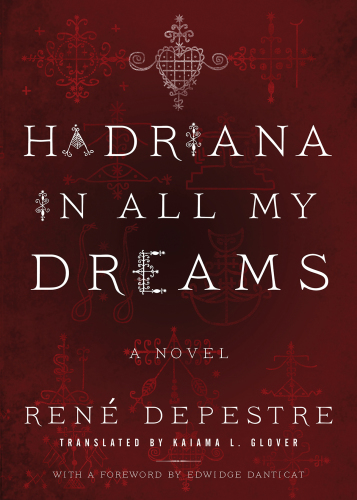
Hadriana in All My Dreams
کتاب های مرتبط
- اطلاعات
- نقد و بررسی
- دیدگاه کاربران
نقد و بررسی

March 6, 2017
The sights and sounds of Haiti’s vibrant carnival season invigorate this tale of vodou and Haitian culture. Set in the town of Jacmel in 1938, the story centers around Hadriana Siloé, a young French woman who drops dead of an apparent heart attack in the middle of her wedding ceremony. Two days later, when her corpse goes missing from her grave, zombification is suspected, and Hadriana’s parents fear that “the Jacmelians—with their necrophilic imagination—had incorporated their daughter into some sort of fairy tale.” The truth of Hadriana’s fate proves more poignant than horrifying, but in Depestre’s hands, this incident is a touchstone of a culture in which distinctions between the empirical and spiritual are obscured, and whose traditional celebrations and beliefs introduce an element of the mythic into the everyday. Eroticism and humor course through his narrative. Depestre’s intimacy with his subject matter and his familiarity with the people he portrays—the story is set in his hometown, at the time when he was 12 years old—give readers an insider’s look at Jacmelian culture.

Starred review from March 1, 2017
If you've ever wondered what ingredients to use to create a zombie out of a living person (and how exactly does one extract the bones of a garter snake's middle ear?), your search ends with this one-of-a-kind novel."I died on the night of the most beautiful day of my life." So begins the testimony of Hadriana Siloe, a sensuous pale-skinned Creole woman who, on the Saturday evening of Jan. 29, 1938, in her Haitian village of Jacmel, collapses at her wedding altar. She had earlier taken a mysterious potion that induces what we would now label "living death." She is buried in the midst of a village bacchanal and later revived by an evil sorcerer. Keep in mind, however, that two-thirds of the book passes before Hadriana gives us her side of the story. Before then, this ribald, free-wheeling magical-realist novel, first published in 1988 and newly, engagingly translated by Glover, examines this traumatic event from many different angles, drawn from before and after Hadriana's...um...passage. There is, for example, the legend of a libidinous young Jacmel citizen transformed into a libidinous butterfly enjoying carnal knowledge of most of the women in town; a town that undergoes precipitous decline tied to Hadriana's misfortune. These and other aspects of the novel's central catastrophe are filtered through the recollections and research of a man named Patrick, whose youthful ardor for Hadriana endures throughout the decades of her afterlife. Patrick, who seems a surrogate for the now-90-year-old Depestre, shows himself throughout to be a true savant on all things zombie, from the aforementioned recipe for "zombie poison" and its antidote to the celebrated cases of "Lil' Joseph [the] zombifier" and the dead-woman-walking known as "Gisele K." By the time you've wandered these spooky, sultry corridors of Haiti's collective subconscious, you're persuaded that the true sorcery being practiced here is that of a mature artist coming to terms--and making peace--with "the natural, the comical, the playful, the sensual, and the magical aspects of Jacmel's painful past." An icon of Haitian literature serves up a hotblooded, rib-ticking, warmhearted melange of ghost story, cultural inquiry, folk art, and veritable l'amour.
COPYRIGHT(2017) Kirkus Reviews, ALL RIGHTS RESERVED.

Starred review from April 1, 2017
Originally published in 1988 and written by one of Haiti's seminal authors, still with us at age 90, this vibrant, erotically charged work shows how humans counter fear--particularly the fear of death--in varied more or less magical ways, even as it paints a fresh and enticing picture of Haitian culture. In the 1930s, teenage Balthazar Granchire has been turned into an ugly butterfly by his adoptive father, a sorcerer angry at his relentless lechery. In that form, he reputedly engages in a string of excessive deflowerings, and he may be responsible for the death of beautiful, beloved young Frenchwoman Hadriana Siloe on the day of her wedding in a notably mixed marriage to local Hector Danoze. The community immediately splits in its response, assuring "a pitiless battle between the two belief systems that have long gone head-to-head in Haitian imagination"; the French Catholics piously observe a wake while others indulge in the "orgiastic excesses of Vodou." Afterward, the corpse of Hadriana disappears, with an uncle of the young narrator carefully giving evidence that she has become a zombie. VERDICT Luscious and affirmative reading, this is work both the serious-minded and the lighthearted can enjoy.
Copyright 2017 Library Journal, LLC Used with permission.

Starred review from April 15, 2017
It would take a long time to unwrap the many layers of metaphor in this ribald and colorful yet strangely haunting novel, written by a son of Haiti who was born in the seaside town of Jacmel, the very setting he so vividly describes here. During the gaudy carnival season of 1938, tragedy strikes: the much loved, pale-skinned Hadriana Siloe drops dead at her wedding altar. The locals are convinced a local villain, Balthazar Granchire, is to blame. In a dazzling dose of magic realism, Balthazar is described as having metamorphosed into a butterfly that deliberately sets about deflowering the city's women. Patrick, one of Hadriana's many young admirers, narrates much of the novel, imbuing it with a touch of nostalgia and wistfulness not just for the woman now deposed but also for Jacmel, the city he loves. For as Hadriana becomes a zombie and lingers on, it is hard not to wonder if her devastating fate is not applicable to Jacmel itself, a town ravaged by hurricanes and extreme poverty. By contrasting Haitian vodou with traditional Christianity, and pitting color and class lines against each other, Depestre presents a rich and nuanced exploration of large and significant themes expertly couched in one fantastical, expertly translated tale.(Reprinted with permission of Booklist, copyright 2017, American Library Association.)

























دیدگاه کاربران